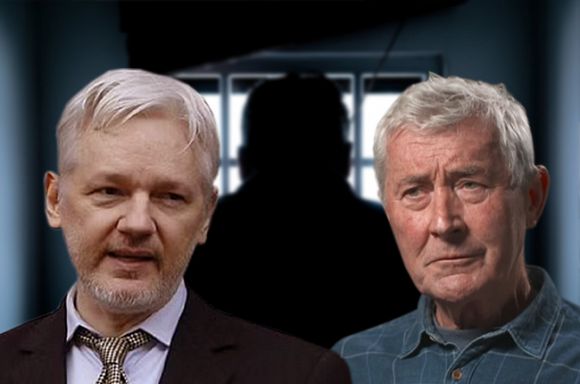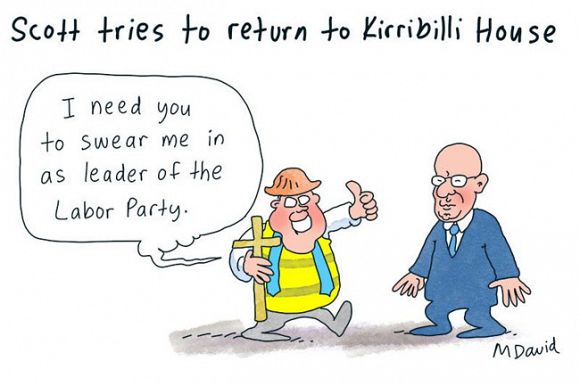Labor's new anti-corruption legislation may prove to be a signal moment but the devil is in the detail. IA founder David Donovan takes a closer look at the draft.
THIS WEEK in Parliament, Attorney-General Mark Dreyfus tabled legislation to create a National Anti-Corruption Commission (NACC).
This may prove to be a signal moment for our troubled nation, so long held back by the greed of a certain cabal, ever willing to trade their powers and power to second-rate opportunists they call “mates”.
Without these people feasting on Australia’s fortune, our nation could become Horne’s dream, more than just a “lucky country” ─ for a selected few.
True, the Dreyfus model is better than the Morrison bill for a public body so feeble it was never even seen to approach Parliament. But the devil is ever in the detail.
Corruption flourishes in the dark, yet withers in the light. Which is why the Federal Government’s decision to only hold public hearings in ‘exceptional circumstances’ sounds a strongly discordant note.
Indeed, all it takes is a small hole for a snake to slither in and this exceptional circumstance rule may prove to be the weak spot.

THE LABOR DECISION
Attorney-General Dreyfus has defended the decision, citing a spectrum of reasons ranging from privacy to prejudicing criminal actions, but they sounded specious, both in Parliament and on podcast.
Writing in The Conversation, the head of Griffith University’s Centre for Governance and Public Policy, Professor AJ Brown, wrote on Thursday (29/9/22):
‘The Government is close to delivering on its promise to create a state-of-the-art anti-corruption body — but isn’t quite there yet.’
Labor gave an election pledge its model was going to be “extremely similar” to models previously introduced by the Greens, Independent MP for Indi Cathy McGowan and her successor, Dr Helen Haines.
However, this Bill differs substantially from those by not introducing a “whistleblower commissioner”, something also identified by past parliamentary inquiries as being required, as well as this new ‘exceptional circumstances’ provision.
The lack of effective protection for whistleblowers is, in our view, an essential component for any effective integrity commission and we will explore this in detail at a later time.
WHAT THE EXPERTS SAY ABOUT THE ‘EXCEPTIONAL CIRCUMSTANCES’ CLAUSE
But don’t just believe us when we say the ‘exceptional circumstances’ exception is a body blow to the new NACC.
Here’s what the experts say ─ the very same experts, indeed, Labor cited as being closely consulted when drafting the NACC legislation.
Transparency International
Transparency International Australia (TIA) CEO Clancy Moore called the new legislation ‘a truly historic step forward on integrity reform’, before condemning the bar set on public hearings:
‘As we told the media yesterday, we are concerned the legislation sets the bar too high on holding public hearings. Public hearings are essential for detecting and preventing corruption.’
Retired judges
The Integrity Committee, a group of retired judges* who have been lobbying for a federal anti-corruption commission since 2017, similarly welcomed the legislation, saying it ‘fills a big gap in Australia's federal integrity system’ and was ‘a strong start in restoring trust in our democracy’.
But like the TIA, the retired judges said the exception test bar – s73(2)(a) – was set too high on holding public hearings [IA emphasis]:
‘...the threshold for holding public hearings is unreasonably high. Public hearings should be permitted when they are in the public interest. An additional hurdle that there must be “exceptional circumstances” is too restrictive.’
The former judges said Parliament should amend the draft laws to remove this clause:
‘The Parliament could amend the draft laws to protect the public’s right to know and deliver a commission with all the powers it needs to uncover potential corruption.’
Accountability Round Table
The Accountability Round Table (A.R.T.), led by senior Melbourne barrister Fiona McLeod SC, was another body cited by the Labor Government as having been extensively consulted regarding the nascent NACC.
Yet, A.R.T. was even more forthright in its opposition to the lofty threshold set on public hearings, saying ‘s73(2)(a) should be deleted’.
McLeod provided historical context in refuting Dreyfus’ claim that public hearings could lead to unwarranted reputational damage:
There have been outstanding results achieved by State and Territory Commissions, as far back as the Fitzgerald Inquiry into police misconduct through the conduct of public hearings.
These hearings provide an important measure of accountability and encourage complainants to come forward with information. They reassure the public that corruption will be investigated and addressed. The assertions of unfair reputational damage flowing from these inquiries have been grossly exaggerated.
The A.R.T. boss says the ‘exceptional circumstances’ test could bog down and even prejudice the new NACC’s workings:
We believe the default setting of private hearings and the public interest threshold test are sufficient protections given the requirement for the Commissioner to already consider the confidential nature of information and any unfair prejudice to reputations, privacy, safety or wellbeing.
The test of “exceptional circumstances” creates an internal inconsistency that will bog down and potentially prejudice the Commission’s internal processes in inevitable Court challenges requiring disclosure of sensitive internal materials under consideration by the Commission or law enforcement agencies.
Centre for Governance and Public Policy (CGPP)
The head of CGPP, Professor Brown, said the proposed NACC ‘model has unexpectedly fallen short in proposing public hearings be available only in “exceptional circumstances”’.
Professor Brown implied the new threshold could breach a Labor election commitment:
‘This limit wasn’t part of the “design principles” Labor took to the election. Nor is it an accurate description of when such powers should be and are used successfully by royal commissions and standing state anti-corruption bodies. It has proved a cumbersome barrier in the only state where it applies (Victoria).’
Research by Brown’s organisation indicates the ‘exceptional circumstances’ test is a counterproductive and potentially dangerous way to mitigate against reputational damage:
‘There are ways to further ensure public hearings are only used where appropriate, to address any fears of a “kangaroo court” or “show trials”.
But our joint research between Griffith University and Transparency International Australia makes it plain: “exceptional circumstances” is unhelpful and potentially dangerous as a test for that purpose.’
Federal ICAC Now
Not consulted by the Government was this publication and long-time anti-corruption crusader, Independent Australia.
IA investigations editor, author of the Ashbygate book and convenor of the Federal ICAC Now (FIN) party, Ross Jones, says the fact the Dutton Opposition has supported the proposed legislation, including the controversial s73(2)(a), is a big ‘red flag’:
That the Coalition supports the current draft of the NACC bill is unsurprising.
And a red flag.
The Dutton-led gang of miscreants should fear an integrity commission, with years of malfeasance waiting to be dragged through the spotlight of public scrutiny.
By supporting the bill in its current form, the Coalition can at least leave the door open that this might not happen.
Dutton is between the proverbial rock and a hard place.
The winds of change are obvious, even if you don’t admit them, and one of the serious political winds is the call for integrity, so Dutton’s best bet is to go with the flow while trying to protect what scant illusions of integrity the Coalition still enjoys.
The FIN convenor says the ‘exceptional circumstances’ clause is a ‘cop out’ and more a ‘sinkhole’ than a ‘loophole’:
‘Labor says it went for the exceptional circumstance test as a way of preventing honest people’s reputations from being unfairly traduced, but in so doing they have left a loophole ─ sinkhole, really.
The “exceptional circumstances” clause is a cop out. If you cannot define exceptional it is meaningless ─ a weasel expression.’
Ross Jones says Australians want transparency and may be unforgiving of Labor if it serves them up anything less:
Australians want accountability and justice for the theft and the rorts and they want the process to be transparent.
If Labor accepts the Coalition’s vote as a way to bypass proposals from the Teals and Independents, it will reek of backscratching and mutual protection in the established political class.
And Labor will have no clothes.
* The Integrity Committee is made up of The Hon Mary Gaudron KC, former judge of the High Court of Australia; The Hon Stephen Charles AO KC, former judge of the Victorian Court of Appeal; The Hon David Harper AM KC, former judge Victorian Court of Appeal; The Hon Paul Stein AM KC, former judge of the NSW Court of Appeal, former President of the Anti-Discrimination Board; The Hon Anthony Whealy KC, former judge of the NSW Court of Appeal; The Hon Margaret White AO, former judge of the Queensland Court of Appeal; The Hon Carmel McLure AC KC, former President of the Western Australian Court of Appeal.
Follow IA founder David G Donovan on Twitter @davrosz. Also, follow Independent Australia on Twitter @independentaus, on Facebook HERE and on Instagram HERE.
Related Articles
- Data in the dark: A look at COVID corruption
- Labor moves quickly on anti-corruption body — but who's watching the watchers?
- Australia's corruption score plummets to shameful new low
- Coalition derails Federal ICAC on technicality
- Australia's first anti-corruption party: FIN is now official
 This work is licensed under a Creative Commons Attribution-NonCommercial-NoDerivs 3.0 Australia License
This work is licensed under a Creative Commons Attribution-NonCommercial-NoDerivs 3.0 Australia License
Support independent journalism Subscribe to IA.

















